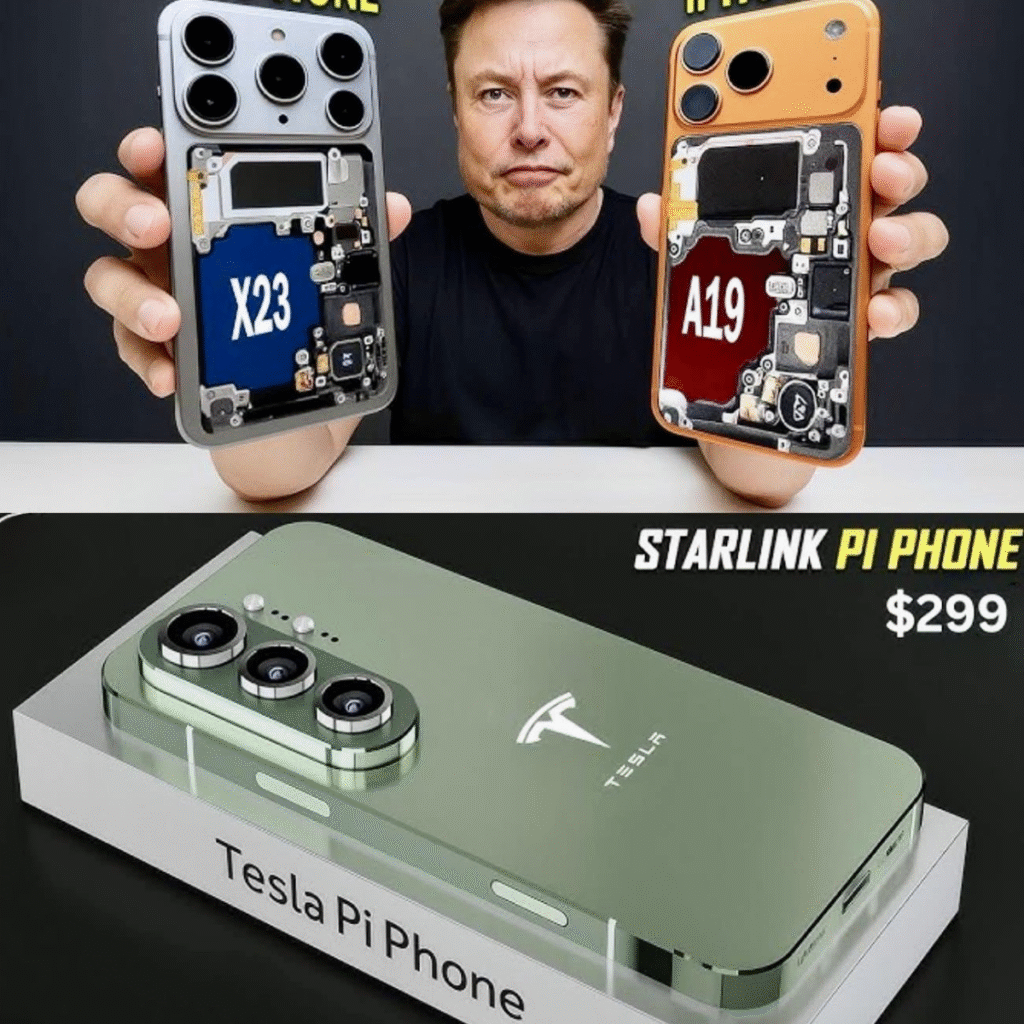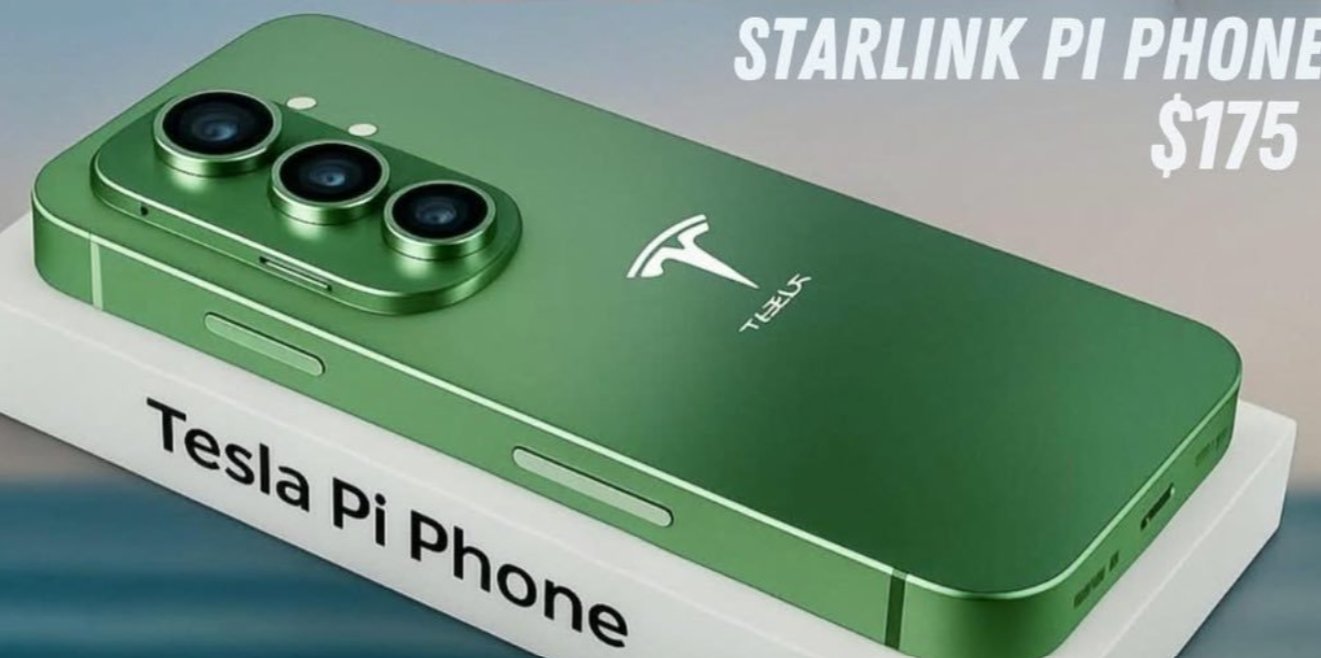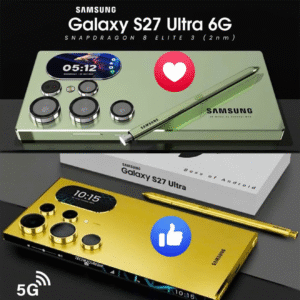
A Shocking Entry into the Smartphone Wars
The tech world is on fire after Tesla officially unveiled its long-awaited Pi Phone, priced at just $789 and bundled with free Starlink internet service. For years, rumors swirled about Elon Musk’s ambition to disrupt the smartphone market, but few expected such an aggressive price and such game-changing features.
Within minutes of the announcement at Tesla’s Giga Texas facility, hashtags like #PiPhone, #StarlinkFree, and #iPhoneKiller dominated Twitter, Instagram, and TikTok. Tech enthusiasts, Apple loyalists, and curious consumers worldwide scrambled to find out if this device truly lived up to the hype.
And the verdict from early reactions? The Pi Phone may be the most disruptive product since the first iPhone.
Free Starlink: The Game-Changer
The headline-grabbing feature is clear: every Tesla Pi Phone comes with built-in Starlink connectivity at no additional cost. This means users can access high-speed internet anywhere in the world, whether in a crowded city or a remote desert.
This is more than a perk—it’s a direct shot at telecom giants and a visionary move to close the digital divide. Millions in rural or underdeveloped regions could, in theory, bypass expensive data plans and weak infrastructure by relying solely on the Pi Phone’s satellite integration.
Industry experts are calling it “the death knell for traditional carriers.”
Sleek Titanium Design
Beyond connectivity, Tesla emphasized design and durability. The Pi Phone sports a sleek titanium alloy body, giving it both a futuristic look and a rugged resilience. It’s lighter than many flagship smartphones, yet engineered to withstand drops, scratches, and extreme environments.

The device is also slim enough to rival the iPhone 17 and Samsung Galaxy Z Fold series, but with sharper edges and Tesla’s signature minimalist aesthetic.
Performance: The X23 Neural Chip
At its heart, the Pi Phone is powered by Tesla’s proprietary X23 Neural Processing Chip, a processor Musk claims is “two generations ahead of Apple’s A19 chip.”
Benchmark leaks suggest blazing speeds for multitasking, gaming, and artificial intelligence applications. More importantly, the chip integrates seamlessly with Tesla’s existing ecosystem — from cars to solar systems — allowing users to control their homes, vehicles, and even financial systems with unprecedented efficiency.
Solar Charging: Infinite Power
In true Musk fashion, the Pi Phone comes with integrated solar charging capability. A compact solar strip on the back allows for trickle charging in sunlight, giving users peace of mind even off-grid.
While not a full replacement for standard charging, early reviewers say this feature could be a literal lifesaver for travelers, adventurers, and emergency situations.

A Built-in AI Assistant
The Pi Phone also debuts Tesla’s next-generation AI assistant: Optimus Voice. Unlike Siri or Alexa, Optimus Voice is directly tied to Tesla’s neural network, capable of advanced real-time translation, contextual awareness, and even predictive tasking.
For example, if you’re driving a Tesla and running late, Optimus can automatically reschedule meetings, reroute navigation, and alert your contacts — all without prompts.
Apple’s Nightmare: The iPhone 17 Killer?
Comparisons to Apple were inevitable. And Tesla leaned into the narrative.
During the launch event, Musk quipped: “Why pay $1,599 for a phone when you can get the future for half that?” The jab was a direct reference to Apple’s newly released iPhone 17 Pro Max, priced at nearly double the Pi Phone.
Analysts immediately began calling the Pi Phone a potential “iPhone killer.” Its price, features, and the allure of free Starlink connectivity create a value proposition Apple will find difficult to counter.
Apple fans defended their brand, pointing to iOS’s stability and the App Store ecosystem. But even diehards admitted the Pi Phone raised the bar.
Global Reactions
The shockwaves didn’t stop in America.
- In China, social media erupted with debates on whether Tesla’s move threatened domestic giants like Huawei and Xiaomi.
- In Europe, regulators scrambled to understand how Starlink integration would affect telecom markets.
- In Africa and South America, excitement surged over the potential to bring affordable internet to remote villages.
One Nigerian blogger wrote: “This isn’t just a phone. It’s liberation.”
Stock Market Tremors
The unveiling also rattled Wall Street. Tesla’s stock surged 11% in after-hours trading, while Apple’s slipped 3%. Telecom companies like AT&T, Verizon, and Vodafone saw shares tumble, reflecting fears of an impending industry shake-up.
Investors see the Pi Phone not just as a product, but as a gateway to a trillion-dollar communications empire built on Tesla’s Starlink backbone.
Critics and Concerns
Not everyone is celebrating. Critics warn that:
- The Starlink free access may only be promotional, with hidden costs emerging later.
- Integration with Tesla’s broader ecosystem could create privacy concerns, given Musk’s ambition to centralize data.
- Supply chain limitations might lead to shortages, frustrating eager buyers.
Still, demand is so overwhelming that Tesla’s pre-order page crashed within minutes of going live.
Fans React: A Cultural Moment
For fans, the Pi Phone has already become a cultural phenomenon. Memes flooded Twitter within hours:
- Side-by-side comparisons mocking the iPhone’s “minor upgrades.”
- Videos of people holding phones to the sky shouting “Free Starlink, baby!”
- Jokes about dropping telecom contracts overnight.
TikTok videos of unboxings and speculative reviews are trending under #TeslaPhoneChallenge.
The Bigger Picture
Musk framed the Pi Phone not just as a device, but as a step toward democratizing technology. He argued that access to connectivity is a human right, not a privilege for the wealthy.
If the Pi Phone succeeds, it could force Apple, Samsung, and global telecom giants to rethink their entire business models.
Conclusion: A New Era Begins
At just $789, with free global internet, solar charging, a titanium body, and a revolutionary X23 chip, the Tesla Pi Phone has positioned itself as more than just another smartphone. It’s a statement. A challenge. A disruption.
For years, Apple defined innovation in the smartphone world. Samsung followed with bold design risks. But now, Tesla has entered the battlefield, and the rules have changed overnight.
Is this truly the iPhone killer fans claim it to be? Time will tell. But one thing is undeniable: the future of smartphones no longer belongs to Apple alone.





